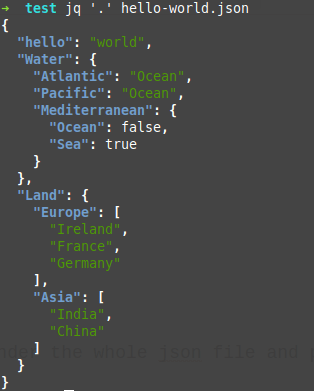What's jq ?
A command line parser for json that can be downloaded here or you can use the playground. I will use this local json file as an beginner example hello-world.json
{
"hello": "world",
"Water":{
"Atlantic":"Ocean",
"Pacific":"Ocean",
"Mediterranean":{
"Ocean": false,
"Sea": true
}
},
"Land":{
"Europe":[
"Ireland",
"France",
"Germany"
],
"Asia":[
"India",
"China"
]
}
}
Using jq
Simplest use case is to render the whole json file and pretty print it
# You can pass filters and json files as arguments
jq '.' hello-world.json
# You can cat the file and pipe it to jq
cat hello-world.json | jq
# You can curl remote json and pipe it to jq e.g. from https://stedolan.github.io/jq/tutorial/
curl 'https://api.github.com/repos/stedolan/jq/commits?per_page=5' | jq '.'
Filtering with jq
The manual is full of options for filtering and can be a lot to take in. We have seen already the most basic filter '.' which can be used with either method of invoking jq to return all data in the json.
# We can filter to specific keys
$ jq '.hello' hello-world.json
"world"
# you can create a new object and create a new json files
$ cat hello-world.json | jq .Water > water.json
{
"Atlantic": "Ocean",
"Pacific": "Ocean",
"Mediterranean": {
"Ocean": false,
"Sea": true
}
}
# We can drill down
$ cat hello-world.json | jq '.Water.Atlantic'
"Ocean"
$ cat hello-world.json | jq '.Water.Mediterranean'
{
"Ocean": false,
"Sea": true
}
$ cat hello-world.json | jq '.Water.Mediterranean.Ocean'
false
# arrays syntax is a little different
$ cat hello-world.json | jq '.Land.Europe[]'
"Ireland"
"France"
"Germany"
$ cat hello-world.json | jq '.Land.Europe'
[
"Ireland",
"France",
"Germany"
]
# Arrays can be accessed by indexes or splits [0:2]
$ cat hello-world.json | jq '.Land.Europe[0]'
"Ireland"
$ cat hello-world.json| jq '.Land.Europe[0:2]'
[
"Ireland",
"France"
]
# array symbol can be used to iterate over values
$ cat hello-world.json | jq '.Land[]'
[
"Ireland",
"France",
"Germany"
]
[
"India",
"China"
]
$ cat hello-world.json | jq '.Water[]'
"Ocean"
"Ocean"
{
"Ocean": false,
"Sea": true
}
# Lots of other array slicing methods available in the manual this is only scratching the surface
You can pipe multiple filters together and reassign values to create new json
$ cat hello-world.json | jq '.Land | .Europe | {EU:[{country:.[]}]}'
{
"EU": [
{
"country": "Ireland"
},
{
"country": "France"
},
{
"country": "Germany"
}
]
}
Using jq files to do more advance stuff
You can use jq files as filters with the -f flag to create more complex filters with supporting functions. The file Node-metrics.json has some cpu and memory usages stats from a Kubernetes Openshift cluster. I am looking to generate a report from this json.
I created the following file filterGenerateCsv.jq to filter the data in the json and creates an csv.
# function definition filter the data
def getNodeMetrics:
[.items[]|
{
name:.metadata.name,
cpu:.usage.cpu,
memory:.usage.memory
}
];
# use geNodeUsages to generate csv
.[] |
getNodeMetrics |
group_by(.name) |
map({
"Node Name": .[].name ,
"CPU Node - Real": [.[].cpu] | add,
"Memory Node - Real": [.[].memory] | add
})| (.[0] | to_entries | map(.key)), (.[] | [.[]]) | @csv
# (.[0] | to_entries | map(.key)) this filter sets the first array as follows
# [
# "Node Name",
# "CPU Node - Real",
# "Memory Node - Real"
# ]
# (.[] | [.[]]) filter generates the arrays of values and @csv pipes to csv format
I can then call the jq file as my filter argument with the -f flag
# Curl the file and use the -f flag for file to point at filterGenerateCsv.jq
$ curl https://gist.githubusercontent.com/austincunningham/eca562b35651b9a6dd214d0023c19cdf/raw | jq -f filterGenerateCsv.jq
% Total % Received % Xferd Average Speed Time Time Time Current
Dload Upload Total Spent Left Speed
100 5594 100 5594 0 0 9497 0 --:--:-- --:--:-- --:--:-- 9481
"\"Node Name\",\"CPU Node - Real\",\"Memory Node - Real\""
"\"ip-10-0-130-91.eu-west-1.compute.internal\",\"130m\",\"1596380Ki\""
"\"ip-10-0-131-137.eu-west-1.compute.internal\",\"115m\",\"1257300Ki\""
"\"ip-10-0-133-196.eu-west-1.compute.internal\",\"248m\",\"1787868Ki\""
"\"ip-10-0-134-141.eu-west-1.compute.internal\",\"473m\",\"3330440Ki\""
"\"ip-10-0-137-148.eu-west-1.compute.internal\",\"127m\",\"1485252Ki\""
"\"ip-10-0-139-72.eu-west-1.compute.internal\",\"172m\",\"1524604Ki\""
"\"ip-10-0-140-152.eu-west-1.compute.internal\",\"113m\",\"1276292Ki\""
"\"ip-10-0-140-180.eu-west-1.compute.internal\",\"609m\",\"4152784Ki\""
"\"ip-10-0-142-230.eu-west-1.compute.internal\",\"667m\",\"4110252Ki\""
"\"ip-10-0-142-51.eu-west-1.compute.internal\",\"727m\",\"4080132Ki\""
More to learn here but I think jq will become something I will use more in the future. The files used in this blog are on this github repo




Top comments (1)
jq is wonderful. It's saved me a lot of trouble when I need to fetch data using curl on the terminal.